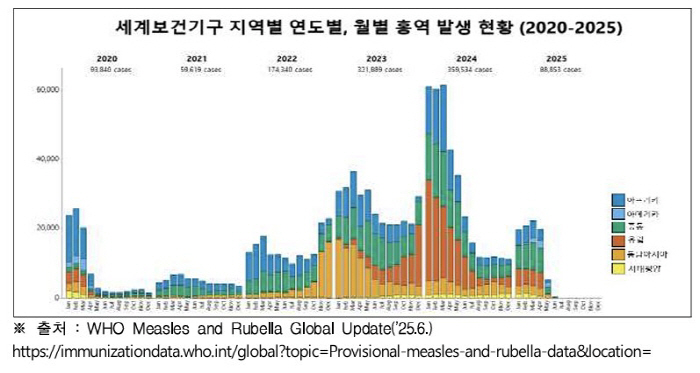Which country are you going to?Measles Emergency Ahead of Holiday
|
According to the World Health Organization (WHO), the number of measles patients worldwide reached about 360,000 in 2024, and the measles epidemic continues not only in Europe, the Middle East, and Africa, but also in Southeast Asia, where many Koreans visit, raising the risk of measles infection while traveling abroad.
In 2025, the number of measles cases (accident rate per million people) in major countries in the Western Pacific region was 377 in Mongolia (257.5), 1,097 in Cambodia (147.9), 288 in Laos (88.9), 336 in Malaysia (23.5), 1,050 in the Philippines (21.6), and 151 in Vietnam (3.6)
Since COVID-19, measles outbreaks have increased worldwide due to increased social exchanges, international travel, and lower vaccination rates during COVID-19, and from 2024 to 2025, outbreaks have increased significantly in countries with low vaccination rates (such as the Philippines, Cambodia, and Vietnam). In Korea, sporadic inflows through travel to countries with measles epidemic continue, so caution against infection during overseas travel is required.
|
Of the patients, 76.9% (50/65) were adults over 19 years of age, and 55.4% (36/65) had no or no measles vaccination history.
If you have suspected measles symptoms such as fever and rash within three weeks of visiting a measles epidemic country, it is important to minimize contact with others, wear a mask, and visit a nearby medical institution to inform medical staff of your overseas travel history and receive medical treatment. In particular, if there are high-risk groups such as infants, pregnant women, or immunocompromised people before the first dose of the measles vaccine at home, if suspicious symptoms occur after traveling abroad, contact at home should be minimized and immediately visited a medical institution for treatment.
Medical institutions should also suspect measles if a patient with a history of overseas travel or contact with an overseas inflow patient shows fever, rash, and respiratory symptoms within the last three weeks, and immediately report it to the local health center if a suspected patient occurs. In addition, medical institutions such as pediatric hospitals that treat infants before the first dose should check the vaccination history of medical staff and staff and complete the vaccination to prevent the spread of measles in the institution.
Measles is a highly contagious respiratory infectious disease that can spread the air, and the incubation period is 7 to 21 days (average 10 to 12 days), and the main symptoms are fever, rash, cough, runny nose, and conjunctivitis, and it is easily spread through contact with measles patients, droplets made through coughing or sneezing. A person who is not immune to measles can be infected more than 90% if they come into contact with a patient, but as vaccination is sufficiently preventable, it is important to complete two measles vaccine (MMR) vaccinations, including 12 to 15 months old and 4 to 6 years old, who are eligible for national vaccination support. In particular, infants under 12 months of age with weak immunity need to be more careful because they have a high risk of complications such as pneumonia, otitis media, and encephalitis when infected, so it is necessary to refrain from visiting countries with measles epidemic as much as possible. In case of unavoidable circumstances, it is recommended that infants aged 6 to 11 months before the first vaccination should also receive a national measles vaccination (accelerated vaccination) before leaving the country. Considering the period from vaccination to defensive immunity formation (usually two weeks), vaccination before departure is necessary.
Meanwhile, Korea is a WHO-certified measles eradication country (2014), and measles has been designated and managed as a quarantine infectious disease since last year.
Usually, symptomatic therapy (stable, hydrated and nourished) alone improves without special treatment, but inpatient treatment is required if there are complications from measles (such as otitis media, pneumonia, diarrhea, dehydration from vomiting, etc.). In addition, measles is a disease that requires quarantine up to 4 days after a rash appears, and if a suspected measles patient occurs at a group facility such as a school, kindergarten, or academy, it is recommended to stop going to school from the moment of discovery until 4 days after the outbreak of the rash. If you are infected in Korea or in Korea, related treatment costs are supported by the government.
This article was translated by Naver AI translator.





